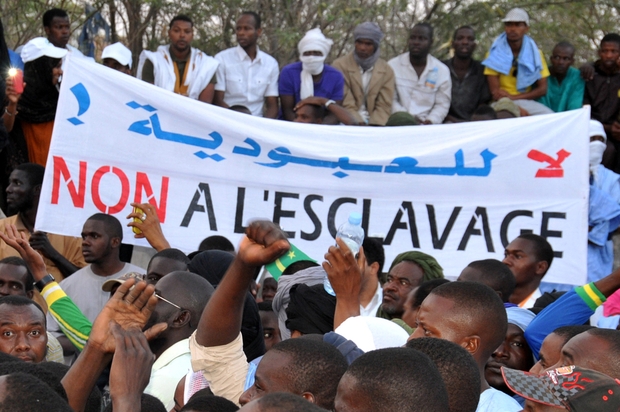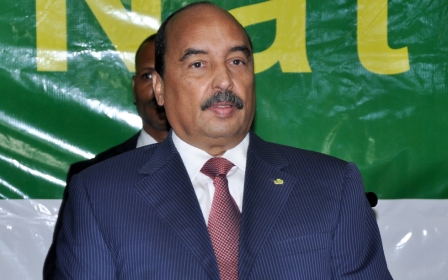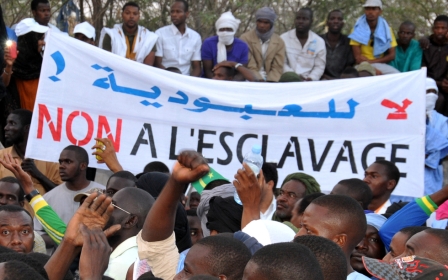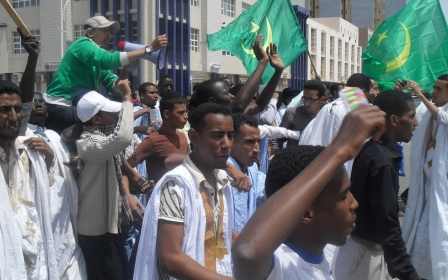10 Mauritanian anti-slavery activists win freedom

Ten Mauritanian anti-slavery activists were on Friday handed their freedom in a partial appeal court victory that left three of their fellow accused in jail, a judicial source said.
An appeals court in the northern town of Zouerate acquitted three of the activists, while seven others were handed jail sentences that they have already served. Three more, however, must still spend time behind bars.
"The court has corrected an error by qualifying the events as an offence, and not a crime. That's very positive," one of the defence lawyers, Bah Ould Mbareck told AFP.
"In the meantime, we're continuing to believe that they're all innocent."
On Wednesday, prosecutors called for a 20-year sentence against the activists, who were originally handed 15-year jail terms at their trial in the Mauritanian capital Nouakchott in August.
The prosecutor accused all 13 activists of launching a "rebellion against the public authority and vandalism".
The public prosecutor did not say whether or not a further appeal would be lodged against the appeal court's decision.
The activists previously claimed to have been tortured in custody, something the prosecution denied.
The 13 were initially convicted of using violence, attacking security forces, gathering while armed and membership of an unrecognised organisation - the Abolitionist Movement.
All the activists had denied being involved in violence and asked to be acquitted.
Amnesty International welcomed their release but implored Mauritanian authorities to investigate the claims of torture and do more to tackle slavery.
'Brutal crackdown'
Amnesty's West Africa campaigner Kine Fatim Diop said in a statement the anti-slavery activists "had been unfairly sentenced" for "peacefully expressing their opinions".
Diop said their release was "a huge relief" for those "campaigning for an end to the brutal crackdown on human rights defenders in Mauritania".
However, she said that the fact that three activists remain in jail was a "distressing sign of the shrinking space" afforded to human rights activists in the country.
"It is even more appalling that the court's ruling ignored the serious allegations of torture that were made by the defendants and that no investigation has yet been launched," added Diop.
The government should "recognise the legitimacy" of those fighting to end "slavery and discrimination", including the Abolitionist Movement, she said.
Balla Toure, vice-president of the movement, insisted his group was "pacifist".
"I am a facilitator of development and not a facilitator of destruction. I don't destroy," he said.
French lawyers for the activists lodged a complaint in Paris against unknown persons for "torture and cruel treatment".
They identified 20 high-level officials they accuse of being the "architects of torture in Mauritania" and asked for French authorities to arrest them if they set foot in France.
Slave caste
Officially, slavery was outlawed in Mauritania in 1981, but the West African country remains a bastion of the practice.
Modern-day slavery under a hereditary system of servitude forces members of the "slave" caste to work without pay as cattle herders and domestic servants, despite an official ban.
Many Mauritanians live below the poverty line and there is a huge disparity between the Arabised moorish elites and the country's black population.
Alongside this case, Mauritania has also come under the spotlight for human rights abuses in respect to a blogger on death row, originally accused of apostasy but then a reduced charge of "infidel" behaviour.
Cheikh Ould Mohamed Ould Mkheitir was sentenced to death in 2014 in the deeply conservative Islamic country over an article he wrote, allegedly challenging decisions taken by Islam's prophet Mohammad and his companions during holy wars in the seventh century.
Mkheitir's article also attacked the mistreatment of the country's black population, blasting "an iniquitous social order" with an underclass that was "marginalised and discriminated against from birth", and to which he belongs.
New MEE newsletter: Jerusalem Dispatch
Sign up to get the latest insights and analysis on Israel-Palestine, alongside Turkey Unpacked and other MEE newsletters
Middle East Eye delivers independent and unrivalled coverage and analysis of the Middle East, North Africa and beyond. To learn more about republishing this content and the associated fees, please fill out this form. More about MEE can be found here.




